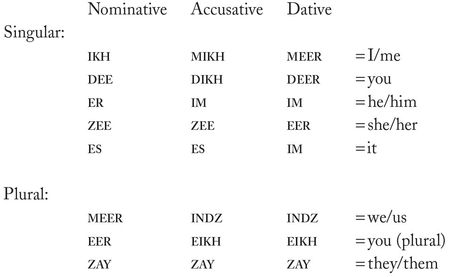Michael Wex - Just Say Nu: Yiddish for Every Occasion (When English Just Wont Do)
Here you can read online Michael Wex - Just Say Nu: Yiddish for Every Occasion (When English Just Wont Do) full text of the book (entire story) in english for free. Download pdf and epub, get meaning, cover and reviews about this ebook. year: 2007, publisher: St. Martins Publishing Group, genre: Detective and thriller. Description of the work, (preface) as well as reviews are available. Best literature library LitArk.com created for fans of good reading and offers a wide selection of genres:
Romance novel
Science fiction
Adventure
Detective
Science
History
Home and family
Prose
Art
Politics
Computer
Non-fiction
Religion
Business
Children
Humor
Choose a favorite category and find really read worthwhile books. Enjoy immersion in the world of imagination, feel the emotions of the characters or learn something new for yourself, make an fascinating discovery.
- Book:Just Say Nu: Yiddish for Every Occasion (When English Just Wont Do)
- Author:
- Publisher:St. Martins Publishing Group
- Genre:
- Year:2007
- Rating:3 / 5
- Favourites:Add to favourites
- Your mark:
Just Say Nu: Yiddish for Every Occasion (When English Just Wont Do): summary, description and annotation
We offer to read an annotation, description, summary or preface (depends on what the author of the book "Just Say Nu: Yiddish for Every Occasion (When English Just Wont Do)" wrote himself). If you haven't found the necessary information about the book — write in the comments, we will try to find it.
A cross between Henry Beards Latin for All Occasions and Ben Schotts Schotts Original Miscellany, JUST SAY NU is a practical guide to using Yiddish words and expressions in day-to-day situations. Along with enough grammar to enable readers to put together a comprehensible sentence and avoid embarrassing mistakes, Wex also explains the five most useful Yiddish wordsshoyn, nu, epes, takeh,and nebakhwhat they mean, how and when to use them, and how they can be used to conduct an entire conversation without anybody ever suspecting that the reader doesnt have the vaguest idea of what anyone is actually saying. Readers will learn how to shmooze their way through such activities as meeting and greeting; eating and drinking; praising and finding fault; maintaining personal hygiene; going to the doctor; driving; parenting; getting horoscopes; committing crimes; going to singles bars; having sex; talking politics and talking trash.
Now that Stephen Colbert, a Catholic from South Carolina and host of the Colbert Report, is using Yiddish to wish viewers a bright and happy Chanukah, people have finally started to realize that theres nothing in the world that cant be improved by translating it into Yiddish. Wexs JUST SAY NU is the book thats going to show them how.
Michael Wex: author's other books
Who wrote Just Say Nu: Yiddish for Every Occasion (When English Just Wont Do)? Find out the surname, the name of the author of the book and a list of all author's works by series.













